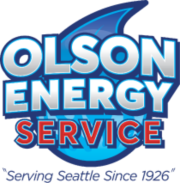-
Should You Switch to a Ductless Mini-Split?
If you’re looking for a smart and cost-effective alternative to having a central HVAC system in your Seattle home, you might want to consider the potential of a ductless mini-split system . A mini-split system is a type of HVAC system that works without the ductwork that central systems require to function. Instead, a mini-split system uses an outdoor unit and an indoor unit—connected by wires through a small hole in the wall—in tandem to heat and cool one or more rooms inside your home. Mini-split systems are easy to add to homes that you’ve just moved into, and they’re a terrific way to upgrade your current house as well. If you don’t want to install ductwork, or if your home is small, a mini-split system may be a better option for you than a new central HVAC system. Mini-split systems are one of the most efficient climate control options available, and they are simple and convenient to operate.
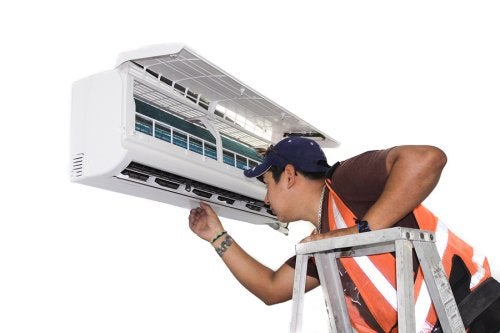
-
Quick Tips for Improving the Performance of Your AC
When the weather starts to warm up, you’ll be grateful for having air conditioning in your Seattle home. If you aren’t careful to take the time to keep up maintenance on your air conditioner, however, you may find that it will not provide you with the level of service you deserve. Having your air conditioner routinely serviced by a maintenance professional will help to ensure that it stays efficient and effective. Here are some other steps you can take to keep your central AC system in excellent condition:
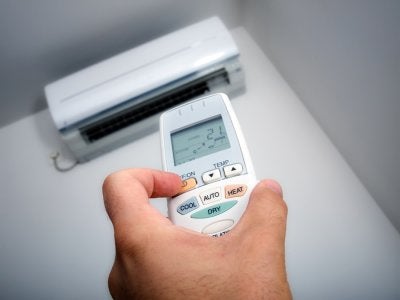
Install a ductless AC. If you simply want a certain area of your house to stay consistently cool throughout the day, you can avoid relying too much on your central AC by having a ductless mini-split system installed there. Ductless AC systems are extremely energy-efficient, and they operate unobtrusively since the compressor is located outside. Installing a ductless system may even qualify you for a federal tax credit.
Change your air filters regularly. Without a clean air filter, your air conditioner’s vents can become contaminated with dust, debris, pollen, and various pollutants. Along with harming the quality of your indoor air, this can make it harder for your air conditioner to cool efficiently as well. Check your air conditioner’s air filter regularly, and change it out for a new one when needed. During periods of heavy AC use, you’ll want to replace the filter at least once a month.
Buy a programmable thermostat. Running your air conditioner when nobody is home is wasteful, and it can also contribute to your high utility bills. If you purchase a programmable thermostat, you can schedule your AC to stop running while your house is unoccupied—or late at night, when everybody is asleep. Exercising more control over your temperature settings can help you conserve your air conditioner’s power for times when you really need it.
““
-
Air Conditioners & Allergies: What Homeowners Need to Know
If your seasonal allergies seem even worse than usual, your air conditioner might be the culprit. It’s not your air conditioning system itself that’s causing your allergies to worsen, of course—it’s the pollutants that are coming through the vents. If you don’t reach out to an air conditioning professional in the Seattle area so you can get routine cleaning and maintenance for your HVAC system, you could be in for a long allergy season. To learn more about the connection between common allergies and your air conditioner, keep reading.
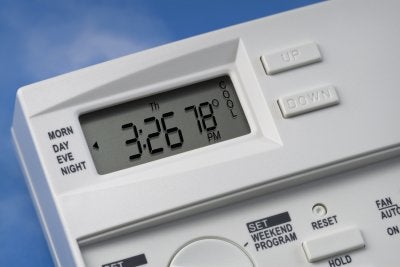
Allergens can be spread by air vents. Your HVAC vents circulate climate-controlled air throughout your home. Unfortunately, they can also circulate pollen, dust mites, mold spores, bacteria, viruses, and numerous other pollutants that can make you and your family sick. If you find yourself suffering from allergy symptoms on a consistent basis when you are at home, you should consider having your air vents inspected by a professional.
Indoor air can be more contaminated than outside air. According to the Environmental Protection Agency , we spend about 90 percent of our time inside. That means that the quality of indoor air makes a significant difference in how healthy we are. If contaminated air is circulating through your HVAC vents, you’ll spend a lot of time breathing it in—which can have a detrimental effect on your health. Cleaning your vents can help you ensure that the air you’re breathing is clean and safe.
Air filters can improve your air quality. Air filters serve to keep the contaminants that get into your vents out of your indoor air, so it’s important to check them from time to time and replace them when necessary. There are also many other devices that can help to reduce the number of pollutants in your air, including air purifiers and germicidal UV lamps. If you’re interested in learning how you can improve your indoor air quality, talk to an HVAC professional today.
-
Is a Fireplace Insert Right for You?
Many homeowners love the thought of warming themselves before a cozy fireplace on a cold winter’s evening. Unfortunately, fireplaces are extremely wasteful of energy. When you use your furnace to warm up the rooms in your house that don’t have a fireplace, you may discover that much of that warm air goes right up the chimney. In addition, the pollutant-heavy wood smoke emitted by older fireplaces isn’t good for the environment.
If you want to enjoy the benefits of a fireplace without the drawbacks, you might consider a fireplace insert . Watch this video from The New York Times to hear the story of one couple who decided to opt for a fireplace insert for their house. If you’re trying to decide whether to have a fireplace insert installed in your Seattle home, the video may help you make your decision.
-
Common Causes of AC Compressor Failure
There are numerous reasons why you might need emergency service for your home’s air conditioning system, but one of the most common issues arises when your AC compressor fails. Replacing your compressor too frequently can be costly, but you can reduce your need to do this by investing in routine preventative maintenance for your AC system. Before you call an air conditioning contractor out to your Seattle home, take a look at this list of the most frequent causes of a failed AC compressor.
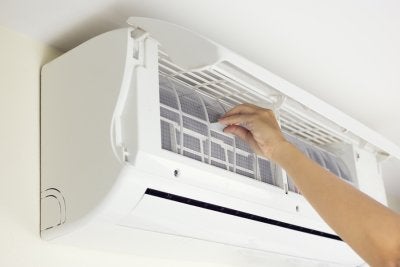
Refrigerant leaks. When refrigerant leaks through a gap or crack in the lines, the level of refrigerant in your air conditioning system naturally begins to decline. This means that a great deal of strain will be put on your compressor—which can eventually lead to a breakdown. If your refrigerant lines become blocked, the same problem can result. Periodic inspections of your refrigerant lines can help to prevent this from becoming an issue.
A dirty system. Everything in your house needs to be cleaned from time to time, and your air conditioning system is no exception to the rule. Over time, the inside of your air conditioning system can become clogged with dust and dirt, which can reduce the effectiveness of your air conditioner and can also put unwanted pressure on your compressor. A routine professional checkup of your entire AC system will ensure that it stays clean, efficient, and effective.
Grime on the coils. If dust and grime are allowed to accumulate on your AC condenser coil, it will force your air conditioning system to work harder in order to provide your home with cool air. This increase in pressure can overwork your compressor and make a breakdown much more likely. The best way to ensure that this doesn’t happen is to schedule routine checkups and cleanings from an experienced air conditioning professional in your area.
““
-
FAQs and Answers About Germicidal UV Lamps
If you’re concerned about the quality of the air inside your Seattle home, talk to an HVAC professional about germicidal UV lamps. These lamps are designed to eradicate many of the contaminants that take up residence inside your air conditioning vents , allowing you to breathe cleaner and healthier air at home. You may be wondering, however, just how effective these UV lamps really are. Here are some of the most commonly asked questions about germicidal UV lamps—and the answers.
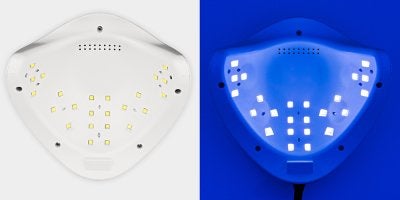
How do UV lamps work? UV lamps emit ultraviolet light, which damages the DNA inside organic pollutants such as bacteria, viruses, and mold spores. When they are aimed at a certain area, UV lamps can kill as much as 99.9% of the organic contaminants in that area.
Do UV lamps work on all pollutants? UV lamps will not eliminate dust, pollen, and other non-organic pollutants. To keep your air conditioning vents clean, you should still be sure to invest in routine cleaning and maintenance from an HVAC professional.
Will I notice my UV lamps at work? The answer is most likely no. UV lamps are silent, and they emit no odor. You probably won’t even notice your lamps at work. Be careful, however, never to look directly at a UV lamp—ultraviolet light is extremely dangerous to your eyesight.
Do UV lamps require any maintenance? You can have your UV lamps checked during your routine HVAC inspections to ensure that they’re working properly. HVAC professionals generally recommend that you replace the bulbs on an annual basis.
Who can benefit from using UV lamps? Clean air is important for everybody, but it may be most important for young children, the elderly, and people who have compromised immune systems. Minimizing exposure to bacteria, viruses, and other hazardous contaminants can make a significant difference in the lives of people who are more vulnerable to illness.
-
Tankless Water Heaters to Consider for Your Home
Tankless water heating has surged in popularity in recent years as homeowners across the globe seek energy-efficient and space-saving solutions for their households. With a broad range of options available, you may be unsure which tankless water heater is best. Follow this guide to help you understand the fundamentals, weigh the pros and cons, and consider the types of tankless water heaters for your home.
How Do Tankless Water Heaters Work?
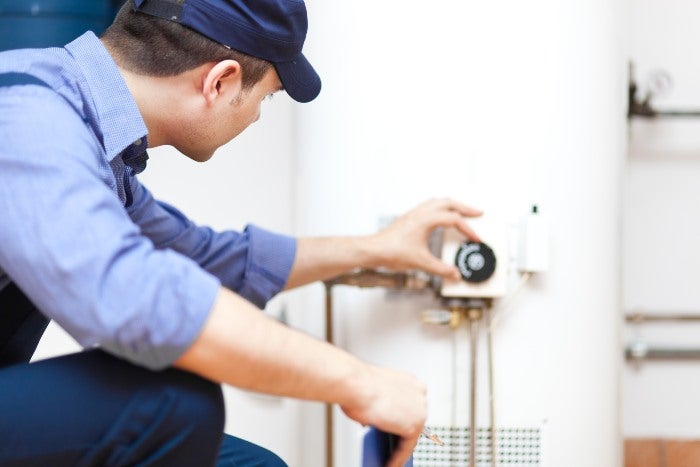
Unlike conventional storage tanks that maintain a large volume of hot water, tankless water heaters generate hot water on demand. They use high-powered gas burners or electric elements to rapidly heat water as it flows through the unit, delivering freshly heated water directly to your faucet without storing it in a tank. This on-demand functionality is highly efficient, space-saving, and eco-friendly.
Pros and Cons of Tankless Water Heaters
Before you decide to switch to a tankless water heater, carefully weigh the pros and cons of this technology.
Pros
- Efficiency and savings: Tankless water heaters only operate when needed, making them highly energy efficient. In fact, they reduce energy consumption by an average of 24 to 34 percent, leading to significant utility savings.
- Longevity: Tankless water heaters are designed for durability, with a lifespan of up to 20 years—around double that of traditional tank models. This longer operational life adds to your long-term savings.
- Small installation footprint: Unlike bulky tank water heaters, tankless units are compact and can be wall-mounted indoors or outdoors, providing more installation flexibility. This frees up valuable space in your home, making tankless units particularly advantageous for smaller residences.
- Continuous hot water supply: Because tankless units provide hot water on demand, you never run out, even after extended usage. This ensures a constant supply of hot water for endless back-to-back showers.
Cons
- Higher initial costs: Tankless water heaters cost more to purchase and install than traditional models. The potential need to upgrade your electrical system or ventilation setup adds to the upfront costs. Even so, the ongoing energy savings and long lifespan of tankless water heaters can offset the higher upfront costs, making them a financially sound investment.
- Limited output: While they provide continuous hot water, tankless heaters struggle to keep up if multiple taps are in use simultaneously. This reduced flow rate could be problematic for large households or homes with high simultaneous hot water demand.
- Inconsistent temperatures: If you shut off the water or lower the flow rate to a trickle, the tankless unit turns itself off. This means when you restore the hot water flow, the temperature may drop before it becomes hot again. This inconvenient phenomenon, called a “cold-water sandwich,” may still be worth it to enjoy significantly more efficient water heating.
Types of Tankless Water Heaters
Even within the category of tankless water heaters, you have a few styles and fuel types to choose from:
- Whole-house tankless water heaters are robust enough to cater to the hot water needs of an entire household. They are installed in a central location, often where your old water heater was installed, and service every faucet and fixture in your home.
- Point-of-use tankless water heaters supply hot water to a single point, such as a bathroom or a kitchen sink. They are compact and easy to install within the cabinet or high on the wall. This can be a cost-effective solution for adding hot water functionality to specific parts of your house while eliminating the wait time for hot water.
- Electric tankless water heaters are easy to install because they don’t require ventilation. However, they may draw substantial power, calling for an electrical system upgrade in some cases. These units are generally well-suited for smaller homes or point-of-use applications.
- Natural gas tankless water heaters are more powerful than electric models, capable of supplying larger volumes of hot water. However, they require proper ventilation to ensure safe operation, which limits where they can be installed.
- Thermostatically controlled tankless water heaters are sophisticated models that use flow-based power modulation to maintain a more precise temperature despite changes in flow rate. This makes every shower more comfortable and helps prevent scalding at the tap, a significant benefit in homes with young children or older adult residents.
Tankless Water Heater Solutions in Seattle, WA
Olson Energy Service is a trusted name in HVAC, electrical, and plumbing services. We have been serving Seattle since 1926 as a family-owned and operated business. Our skilled and experienced technicians can help you select a tankless water heater and conduct a professional installation, ensuring your complete satisfaction for years to come. If you’re ready to go tankless, please call us today at 206.782.5522 or contact us online to request tankless water heater services in Seattle, WA.
-
Our Emergency AC Repair Services
No Seattle homeowner ever wants to be left without a working air conditioner when the summer is at its hottest. That’s why it’s essential to have an air conditioning contractor you can always depend on to provide you with capable service in a crisis. At Olson Energy Service , we offer emergency HVAC service 24 hours a day, seven days a week, to customers in the Seattle area. If you’re experiencing any issues at all with your air conditioning system, our expert technicians can diagnose the problem and repair it in short order. Our team has experience responding to a wide array of HVAC problems, from failed compressors to cracked refrigerant lines. We offer preventative maintenance services to help extend the life of your AC system, and we’ll also be happy to replace your current system with a brand-new one. When you’re having trouble with your AC system, don’t hesitate to contact our team for immediate assistance.
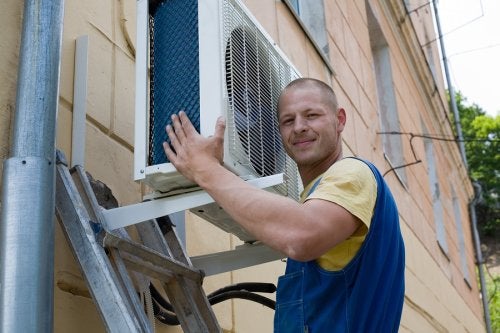
-
Does Your Home Have a Hardwired Smoke Detector Yet?
In order to protect yourself and your loved ones against the dangers of a household fire, it is critical to install smoke detectors throughout your home. A contractor that repairs boilers and air conditioners serving Seattle can also provide you with a new smoke detector installation. To improve the safety and reliability of your smoke detectors, it may also be a good idea to talk to your HVAC contractors about the possibility of choosing a hardwired smoke detector.
A hardwired smoke detector offers many benefits to your household. Unlike battery-powered smoke detectors, which will cease to function if their batteries run out of power, hardwired smoke detectors are connected to the main electrical grid of your property. Whether your fire has been caused by a furnace problem or another type of emergency, your hardwired smoke detector will immediately alert you to the presence of fire dangers. Since hardwired smoke detectors also contain battery backups, they will function properly with or without power from your home’s electrical system.
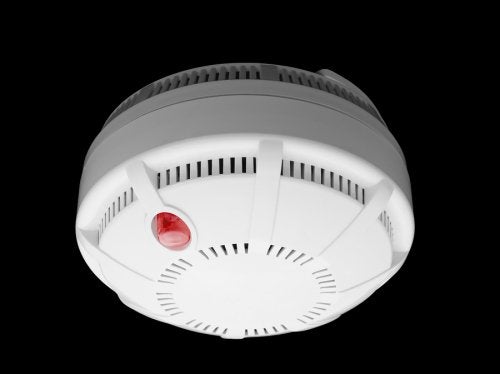
““
-
Should I Replace My Air Conditioner?
When the summer season arrives in Seattle, you will want to make sure that your air conditioner is ready to keep your home’s interior cool and comfortable. If your air conditioner is more than 15 years old, it could be reaching the end of its lifespan. With services from an HVAC company that specializes in air conditioning near Seattle , you will be able to replace your unit before the summer months kick into full gear. To help you decide whether it is time to set up an appointment with your HVAC contractors, here is a look at some signs that it is time to replace your air conditioner.
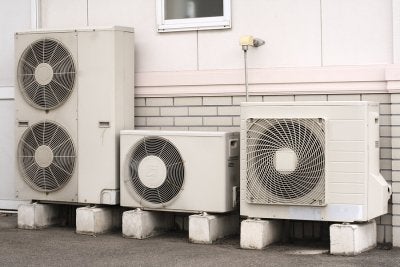
Your System Is Getting Old
Age is a primary factor to consider when you are deciding whether to replace your air conditioning unit. When you install a brand new air conditioner in your home, it will have an expected lifespan of about 15 years. Relying on the same air conditioning system for 15 years or longer could eventually lead to efficiency and maintenance problems.
You Are Facing Costly Repairs
At a certain point, the cost of repairing your old system may be more than the price of purchasing a brand new unit. If you are deciding between air conditioner repair or replacement, you can ask your HVAC technician to provide you with an estimate for the costs of your repairs. Rather than footing the bill for a major repair service, you may be better off simply purchasing a brand new unit.
You Can No Longer Purchase the Right Coolant
Older air conditioning systems typically rely on R-22 Freon, which is a special type of refrigerant. Due to the environmental impact of R-22 Freon, this type of refrigerant is harder to find and more costly to install. If your air conditioner needs to be recharged wit R-22 Freon, you may end up spending hundreds of dollars on this service. With a brand new air conditioner, you can rest assured that your system runs on a coolant that is affordable, environmentally friendly, and easy to find.
RECENT POSTS
categories
- Uncategorized
- Air Conditioner
- Fireplace Inserts
- Fireplace Insert Installation
- Air Conditioning Installations
- Air Conditioning Units
- Air Conditioner Maintenance
- HVAC Professionals
- Heat Pump Installation
- Heating and Cooling
- HVAC Unit
- Heat Pumps
- Furnace
- Furnace Service
- Tankless Water Heaters
- Water Heaters
- Energy Efficiency
- HVAC Contractors
- Olson Energy Service
- Mini-Split Systems
- Ductless Air Conditioner
